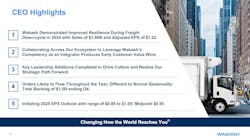A record year is tough to follow, especially in a down market for trailers, but Wabash executives accentuated the positive in explaining the company’s Q4 and 12-month earnings results.
“As we reflect on 2024, it's clear that this has been a pivotal year for Wabash,” President and Chief Executive Officer Brent Yeagy said in a conference call with investment analysts. “Building on the record-setting financial and strategic accomplishments of 2023, we continue to demonstrate the improved resilience of our business portfolio during an industry down cycle.
“And, more importantly, we've continued to innovate and invest in a manner that's unprecedented relative to the market conditions.”
Wabash posted net sales net sales were $416.8 million for the 2024 fourth quarter, compared to $596.1 million for Q4 the year before. Operating income was $3.6 million, down from $61.1 million. For the full year, net sales came to $1.95 billion, down from $2.54 billion in 2023, while net income showed a $356.1 million loss, largely attributable to a $450 million legal settlement in a Missouri accident case that is under review. Wabash posted earnings of $312 million in 2023.
A “more diversified portfolio” helped Wabash manage the cyclical downturn in the dry van market. Yeagy cited rising parts and services revenue and a series of new joint ventures and partnerships put together in 2024 as forming the “foundation for scalable growth” going forward.
Likewise, the trailer-as-a-service partnership with autonomous-truck technology provider Kodiak illustrates “goes well beyond Wabash” to bring together dealer service capabilities to ensure uptime and advancing autonomous trucking.
“The growth of collaboration across our ecosystem has been a key theme in 2024,” Yeagy continued. “By leveraging our ecosystem to navigate shifts and seize emerging opportunities, we're in the early innings of using our competencies as an integrator to develop innovative solutions to industry challenges.
“The actions we took as an organization in response to the first round of Trump tariffs have held over the past four years, and we feel that our supply chain is very well positioned to insulate Wabash from any direct impact stemming from tariffs on components manufactured abroad,” Yeagy said. “Thinking more broadly about the potential impact of U.S. tariffs, we've already seen nearshoring activity ramp up for multiple reasons in recent years. To the extent that tariffs act as an accelerant to the nearshoring trend. We believe that foreign imports of goods being replaced by North American manufacturing activity has an outside positive impact on dry van trailer utilization.”
Market conditions
In terms of the market outlook, Wabash has developed a system of leading indicators, based around the numerous subsegments of freight generators “within the overall carrier landscape,” Yeagy explained.
“Some [of these sectors] are much more important than others, in terms of where it creates overall freight volume, regional freight volume, and its effect on rates,” Yeagy said. “What we're looking for should be a subset of those freight drivers that are beginning to move in a positive direction—and we're seeing those were going the opposite direction this time last year. That's a fundamental difference from where we're at today rather than where we were a year ago. That gives us an underlying conservative optimism: When the market starts to turn, those carriers that are more exposed to those subsectors will tend to do better first—and we can somewhat see that by the conversations that we're having with our customers. That's a more straight-line linkage to what really drives the market than some of the lagging indicators that we have tended to use.”
Regarding the Trump Administration’s talk of new tariffs, Yeagy noted that Wabash undertook steps following “the 2018 Trump tariff onslaught” that have “dramatically reduced” the company’s exposure, characterizing it “almost de minimis” at this stage.
“We have built quite a moat around the incoming supply tariff risk. We know our competitors are still substantially exposed to that tariff risk across many different dimensions, so we feel pretty good about that,” Yeagy said. “From a manufacturing location standpoint, we have one facility that has some level of exposure to potential tariffs on Mexico. Our competitors have substantially more exposure than we do, and we have available capacity in our domestic operations to shift production as needed to minimize those tariff impacts if they were to occur.
“We don't know exactly how, in what construct, or how long, but we know we have put the right pieces in place to manage it one way or the other. So we're not overly concerned at this point."
Speaking more broadly about the potential impact of U.S. tariffs, Yeagy noted the economy has already seen nearshoring activity ramp up “for multiple reasons” in recent years.
“To the extent that tariffs act as an accelerant to the nearshoring trend, we believe that foreign imports of goods being replaced by North American manufacturing activity has an outside positive impact on dry van trailer utilization,” he said.
Segment highlights
During the fourth quarter, Transportation Solutions achieved net sales of $370.5 million, a decrease of 32.3% compared to the same quarter of the previous year. Operating income was $17.9 million, or 4.8% of sales.
Parts & Services' net sales for the fourth quarter were $48.6 million, a decrease of 12% compared to the prior year quarter. Operating income was $4.5 million, or 9.2% of sales.
For Q4, Wabash shipped 6,770 new trailers, compared to 10,075 trailers for the period last year. Twelve-month trailer shipments totaled 32,100 in 2024, down from 44,450. Truck body shipments for the quarter were 3,010, down from 4,075. For the year, Wabash shipped 14,255 truck bodies, compared to 16,070 truck bodies in 2023.
About the Author
Kevin Jones
Editor
Kevin has served as editor-in-chief of Trailer/Body Builders magazine since 2017—just the third editor in the magazine’s 60 years. He is also editorial director for Endeavor Business Media’s Commercial Vehicle group, which includes FleetOwner, Bulk Transporter, Refrigerated Transporter, American Trucker, and Fleet Maintenance magazines and websites.
Working from Beaufort, S.C., Kevin has covered trucking and manufacturing for nearly 20 years. His writing and commentary about the trucking industry and, previously, business and government, has been recognized with numerous state, regional, and national journalism awards.

